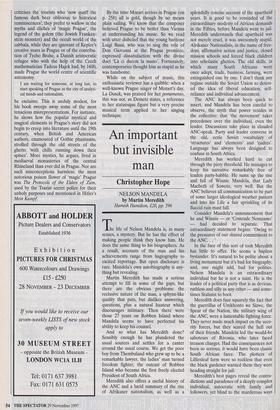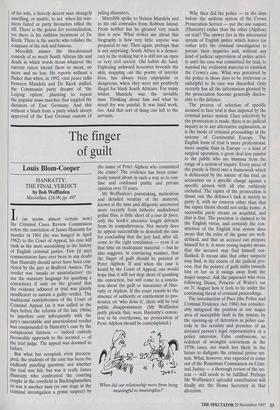An important but invisible man
Christopher Hope
NELSON MANDELA by Martin Meredith Hamish Hamilton, £20, pp. 596 The life of Nelson Mandela is, in many senses, a mystery. But he has the effect of making people think they know him. He does the same thing to his biographers. As a result, accounts of the man and his achievements range from hagiography to excited reportage. But open disclosure is rare. Mandela's own autobiography is any- thing but revealing.
Martin Meredith has made a serious attempt to fill in some of the gaps, but there are the obvious problems: the reclusive nature of the man, a sphynx-like quality that puts, but dislikes answering, questions, plus a natural hauteur which discourages intimacy. Then there were those 27 years on Robben Island where Mandela seems to have perfected his ability to keep his counsel.
And so what has Meredith done? Sensibly enough he has plundered the usual sources and settles for a canter around the usual course. We get the poor boy from Thembuland who grew up to be a remarkable lawyer, the ladies' man turned freedom fighter, the outcast of Robben Island who became the first freely elected President of South Africa.
Meredith also offers a useful history of the ANC and a lucid summary of the rise of Afrikaner nationalism, as well as a splendidly concise account of the apartheid years. It is good to be reminded of the extraordinary modesty of African demands in the Fifties, before Mandela went to jail. Meredith understands that apartheid was not merely cruel, it was awesomely stupid. Afrikaner Nationalists, in the name of free- dom, affirmative action and justice, closed mission schools and forced black children into scholastic ghettos. The old skills, in which many South Africans were once adept, trade, business, farming, were extinguished one by one. I don't think any regime outside the Soviet Union so detest- ed the idea of liberal education, self- reliance and individual advancement.
The ANC has always been quick to assert, and Mandela has been careful to observe, the myth that power resides in the collective: that 'the movement' takes precedence over the individual, even the leader. Discussions take place in clouded ANC-speak. Party and leader converse in the old, eerie Soviet vocabulary of `structures' and 'elements' and 'cadres'. Language has always been designed to confuse in South Africa.
Meredith has worked hard to cut through the piety threshold. He manages to keep his narrative remarkably free of leaden party-babble. He sums up the rise and fall of Winnie Mandela, that Lady Macbeth of Soweto, very well. But the ANC believes all communication to be part of some larger ideological weather pattern and into his Life a fair sprinkling of its flaccid rain must fall.
Consider Mandela's announcement that he and Winnie — or 'Comrade Nomzamo' — had decided to separate. That extraordinary statement begins: 'Owing to the pressures of our shared commitment to the ANC. . . '
In the face of this sort of tosh Meredith has little to offer. He seems a hapless bystander. It's natural to be polite about a living monument but it's bad for biography, and, one might add, bad for politics. Nelson Mandela is an extraordinary individual but he is not a saint. He is the leader of a political party that is as devious, ruthless and silly as any other — and some- times Stalinist to boot.
Meredith does face squarely the fact that the guerrillas of Uinkhonto we Sizwe, the Spear of the Nation, the military wing of the ANC, were a lamentable fighting force. They never made much impact on the secu- rity forces, but they scared the hell out of their friends. Mandela led the would-be saboteurs of Rivonia, who later faced treason charges. Had the consequences not been so serious, it would have been classic South African farce. The plotters of Lilliesleaf farm were so reckless that even the black gardener warned them they were heading straight for jail.
Meredith's best pages reveal the contra- dictions and paradoxes of a deeply complex individual, autocratic with family and followers, yet blind to the murderous ways of his wife, a fiercely decent man strangely unwilling, or unable, to act when his min- isters failed or party favourites rifled the till. There is the genius for reconciliation, yet there is his ruthless treatment of De Klerk. There is the ascetic who relishes the company of the rich and famous.
Meredith misses the bloodstained comedy of so much South African life and death in which words mean whatever the current rulers intend them to mean, no more and no less. He reports without a flicker that when, in 1992, vital peace talks between Mandela and De Klerk stalled, the Communist party dreamt of 'the Leipzig option', planning to repeat the popular mass marches that toppled the dictators of East Germany. And this without a blush from a party which always approved of the East German custom of jailing dissenters.
Meredith spoke to Nelson Mandela and to his old comrades from Robben Island. From neither has he gleaned very much that is new. What strikes me about this biography is how very little anyone was prepared to say. Then again, perhaps that is not surprising. South Africa is a democ- racy in the making but it is still not an open or very civil society. Old habits die hard. Exploring awkward honesties beneath the skin, mapping out the poetry of interior lives, has always been unpopular or dangerous, when they were not positively illegal for black South Africans. For many whites Mandela was the invisible man. Thinking about him and what he stood for was painful. It was hard work, too. And that sort of thing one left to the servants.



















































































 Previous page
Previous page